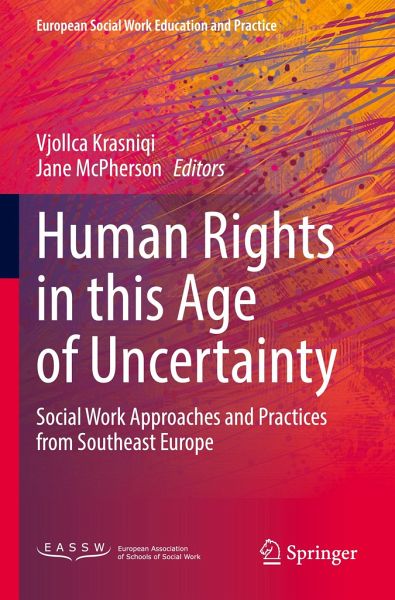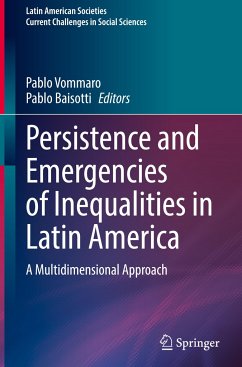
Human Rights in this Age of Uncertainty
Social Work Approaches and Practices from Southeast Europe
Herausgegeben: Krasniqi, Vjollca; McPherson, Jane
Versandkostenfrei!
Versandfertig in 6-10 Tagen
65,99 €
inkl. MwSt.

PAYBACK Punkte
33 °P sammeln!
This book, grounded in a human rights framework, takes a close look at social work approaches and practices in Southeast Europe. Human rights are central in today's understanding of social work as an academic discipline and as a professional practice. Looking at social work through a human rights lens unmasks inequality and discrimination, promotes ethical engagements, and contributes to the social, political, and economic betterment of society. Moreover, human rights and social work are interdependent and have far-reaching implications at macro, mezzo, and micro levels both in the realm of so...
This book, grounded in a human rights framework, takes a close look at social work approaches and practices in Southeast Europe. Human rights are central in today's understanding of social work as an academic discipline and as a professional practice. Looking at social work through a human rights lens unmasks inequality and discrimination, promotes ethical engagements, and contributes to the social, political, and economic betterment of society. Moreover, human rights and social work are interdependent and have far-reaching implications at macro, mezzo, and micro levels both in the realm of social policy and in professional practice.
This collection of eight chapters provides an overview of human rights practices in social work in Albania, Bosnia and Herzegovina, Bulgaria, Croatia, Kosovo, Romania, and Slovenia. It presents state-of-the-art research on human rights and social work through individual country-focused chapters. In addition, it includes an integrative introductorychapter that identifies and discusses the commonalities and differences across the region as well as future directions.
The book takes an integrated approach with conversations among the contributors on three main questions:What is the state of human rights in social work?How are human rights practiced in social work? What are the prospects for an integrated approach to human rights in social work in contemporary Southeast Europe?Human Rights in this Age of Uncertainty is essential reading for social work academics and practitioners in Southeast Europe due to its geographic focus and standpoints from the specific countries of the region. The book also should appeal to a wider European audience (especially as the book features chapters from both inside and outside of the European Union), as well as to an international audience of social work scholars. In addition, policy-makers may find the book a useful resource because human rights discourse features prominently in the international approaches to welfare systems across Southeast Europe as part of the Europeanisation processes currently at play.
This collection of eight chapters provides an overview of human rights practices in social work in Albania, Bosnia and Herzegovina, Bulgaria, Croatia, Kosovo, Romania, and Slovenia. It presents state-of-the-art research on human rights and social work through individual country-focused chapters. In addition, it includes an integrative introductorychapter that identifies and discusses the commonalities and differences across the region as well as future directions.
The book takes an integrated approach with conversations among the contributors on three main questions:What is the state of human rights in social work?How are human rights practiced in social work? What are the prospects for an integrated approach to human rights in social work in contemporary Southeast Europe?Human Rights in this Age of Uncertainty is essential reading for social work academics and practitioners in Southeast Europe due to its geographic focus and standpoints from the specific countries of the region. The book also should appeal to a wider European audience (especially as the book features chapters from both inside and outside of the European Union), as well as to an international audience of social work scholars. In addition, policy-makers may find the book a useful resource because human rights discourse features prominently in the international approaches to welfare systems across Southeast Europe as part of the Europeanisation processes currently at play.














